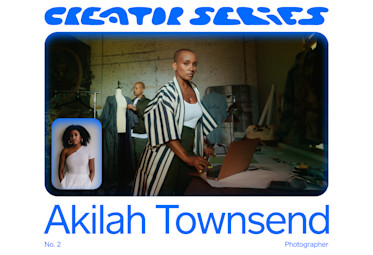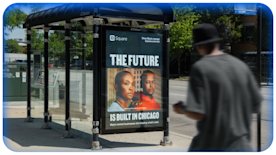The Future Is Built in Chicago celebrates the city’s Black business owners for the community pillars they are. Portrait installations on billboards and bus stops reflect their deeply felt presence and remind us of what’s possible — how we can shape our communities and our own lives. For the second installment of Creator Series, we spoke with photographer Akilah Townsend, a Chicagoan through and through, whose heroic portrait work for the project broadcasts these possibilities far and wide across the city.
In this series we chat with some of our creative partners and collaborators from over the years. This round, Akilah Townsend and Global Brand Group Creative Director Eileen Tjan go deep on building a career in art. They talk about how Townsend made it a reality and how increasing representation in both art and business can help new generations of creatives and entrepreneurs do the same.
I’d love to start our conversation by pinpointing an early moment or memory where you remember being compelled to create.
I remember being really little, and my late mother — she would have the most beautiful cartoon doodles all scattered around the house. There could be envelopes. There could be receipts. She did HR stuff, and I always wondered, like, “Why isn’t she an artist? These are incredible.”
I think she passed down that creative gene, because I can’t even remember the exact moment for me, but I was always drawing, I was always painting. Photography came pretty late, but I always had some creative outlet, be it style, fashion, graphic design.
And it feels so beautiful that I have the privilege to work as an artist, for this to be the thing that sustains me, because I imagine I'm probably one of the first in my lineage to have this type of opportunity. I have so much gratitude when I think about it.
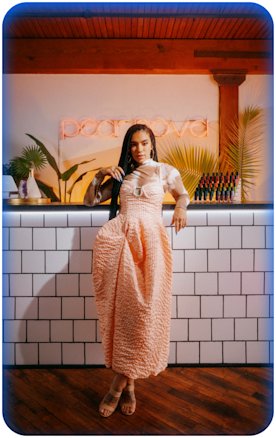
When did photography actually come into play for you? When did you know you wanted to start?
I think I always wanted to be an artist. And probably like my mom, I didn’t know that it was actually a feasible career. I was told that you had to get a safe job, you know? So I sought that comfort and stability. I actually went to school for environmental law, and I became an environmental consultant. I was trying different things with art as a hobby because I knew I couldn’t afford art school.
I didn’t think that there was any such thing as a working artist; I thought there was only a starving artist.
I didn’t know what professional art looked like. I got into photography because my roommate had this Canon Rebel T6. I found it in the house, and she didn’t know how to use it. I was like, “Oh, I’ll teach you, and I’ll learn myself.” I didn’t even know myself! So confident.
In that process, I was like, “Oh, this … I love this.” I actually had taken a summer course in high school. I just couldn’t afford a camera at the time, so it didn’t continue past that. I think when I got my roommate’s camera, it just snapped me back to where I wanted to be. From there, it started off as a hobby, and then I started getting commissions.
Bringing us back to the present, I’d love to hear about your personal experience and perspective working on The Future Is Built in Chicago.
I am so grateful that I was able to work on that. People have found my Instagram and said, “Oh my god, you took these images?” or, “I see them all over Chicago — they’re beautiful!” or, “You made these women look beautiful.” Seeing these Black women on these billboards and super large on these bus stops … What I came in hoping to do was make them look beautiful and show them in a spotlight, and I think we did that.
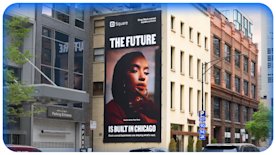
That has an effect. I feel like little me from 79th Street, seeing these beautiful Black women on this beautiful bus stop, saying, "Oh, that's a business owner.” There are so many possibilities. And kind of like how I didn’t really know that there were opportunities in art to sustain yourself, it’s so powerful. Representation is paramount. It’s paramount just being able to see that kind of thing in the hood, where I came from. It means so much.
I’m in a group called Black Women Photographers, and we were talking about how Naomi Campbell’s first time being photographed by a Black woman was in, like, 2019 or something. Same thing with Gabrielle Union. I mean, we’ve been here this whole time. And we definitely have the talent, you know? We just haven’t been given the opportunity to show what we’ve got.
Being able to show other Black photographers — other Black women photographers — what’s possible is really special.
This project was great because you came in with an idea, but you also allowed me to work with that idea. I felt a lot of freedom creatively. The creatives from Square that came out during the shoot made me feel trusted. There were times where I was like, “I wanna do this.” And then I would do it, and then they used it! It was really affirming to be given a bit of space, to be trusted with my creative vision.
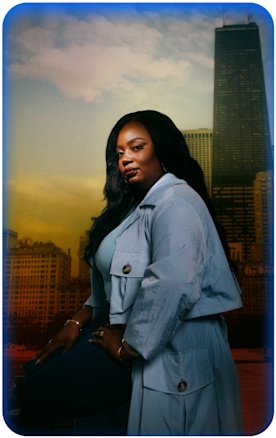
What was the response from your peers or your friends or family or the community? What have you heard in Chicago?
For me, the most special moment was bringing my 70-year-old dad to the billboards. That was such a touching moment, because I tell my dad, like, “Oh, yeah, I’m working for this company and that,” and I feel like it’s not tangible — like he doesn’t get it. When I started working with The New York Times, he was like, “Oh. Okay, that’s cool. I know them.” (laughs) But actually bringing him to the billboard and being able to talk about the process and about the backdrop, he was like, “Okay, it’s clicking now. I get it.”
Stories are how we understand what's really there. The most amazing feedback when it comes to friends and other people my age in Chicago is that everyone is just so proud and so amazed that the project is so beautiful. It’s such a great feeling. I feel seen by my city.
Did you know any of the businesses we worked with on Built in Chicago? I’d also love to hear about how you see Chicago’s Black business owners and creatives shaping the future.
Ever since I was a teenager, I’ve loved Sir & Madame. I’ve been shopping there since I was, like, 14. I remember when I was in college and a waitress, I served them at a table. So this was a full-circle moment. I had never been to Semicolon, and I had worked over there, literally a few blocks away. And it’s such a gem.
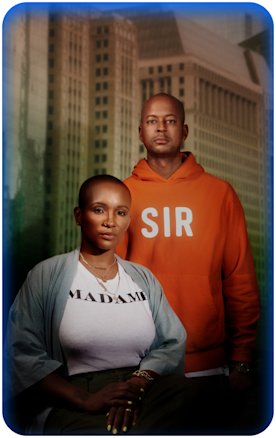
So much culture comes from Black people, from a lot of the Black creatives and entrepreneurs that I know here. There is so much talent, so much creativity. It’s just nice to have that spotlight on them. I’m certainly excited to see what happens in the coming years as we get recognized for the creative hub that we are. I think a lot of companies are realizing that and not treating us like a flyover city anymore.
So at Square, our purpose is economic empowerment. We want everyone to be able to participate in the economy. What does that look like to you?
I think entrepreneurship is something that is definitely on the rise, especially in the Black community. We are realizing that ownership is our route to freedom. I’ve seen a lot of talk on that recently.
When I think about where I come from and the challenges that exist there, we need that lower barrier to entry when it comes to business and entrepreneurship, because, a lot of times, we aren’t fortunate enough to get the formal education and go to business school and things like that. That’s how we empower ourselves and create community and autonomy. Our neighborhoods are being gentrified, and we’re getting pushed out. Financial freedom is the only way.
Even being a freelancer and having ownership of my time, the freedom that comes with that — when you’re setting your own schedule and listening to your own body and that’s what’s determining your hours of work — I think that is the true meaning of success. Being able to have ownership over your whole life, right? When you’re not answering to someone who might be racist or bigoted, you have freedom.
And then you also have the money to pour back into your community and change things.
When we have the money in our pockets, we can determine where our money goes. We can put that toward sustainability and feeding our community.
Can you think of any ways brands might be able to empower communities or connect with audiences in more meaningful ways?
I definitely would say authenticity. You hire people from Chicago, like myself, the stylist, everyone — people who understand the demographic you’re trying to reach. It’s authentic because it’s coming from us. We are telling a story and know how to control the narrative so that it is actually received.
I think a lot of companies don’t do it well, and it doesn’t come off as authentic. It’s clear when somebody wasn’t in the room who needed to be, you know? There wasn’t a Black person helping this come alive. If you want to reach us, you have to work with us, you have to collab with us. If you want it to translate and to be authentic, it has to actually be authentic.
What do you think Square can do to continue to help support more businesses in the future?
If I could think of anything else, it’d be getting into the neighborhood, getting into the places where there’s actually moving and shaking, and educating people about financial literacy and entrepreneurship.
That’s it. That’s huge, and we definitely will continue to do so. We need to listen and keep figuring out how to educate, collaborate, continue to open up doors in this economy, and also produce beautiful creative work. Thank you so much, Akilah.
Thank you for having me. I have so much gratitude for the Square team and the Square company for hiring me on this project. It was incredible. This interview has been such a joy.

